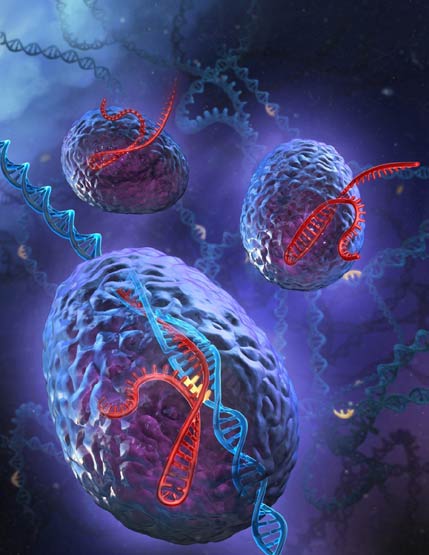 A 3D artist's rendering of the powerful genome editing tool, CRISPR/Cas9.
A 3D artist's rendering of the powerful genome editing tool, CRISPR/Cas9.Photo by: Stephen Dixon for The Washington Post
Which technology promises to most dramatically change our lives? A plausible answer is artificial intelligence. But a lot of smart people would say biotechnology. Or maybe both --- in a glorious scientific tango.
Genetic engineering and molecular biology benefit from the processing power creating by the digital revolution. There's a convergence happening --- and this is arguably the biggest story in the world right now.
Not long ago I walked around Kendall Square with Juan Enriquez. He's an academic, an investor, and the co-author of "Evolving Ourselves: How Unnatural Selection and Nonrandom Mutation Are Changing Life on Earth." The book's premise: We're undergoing directed evolution. Darwinian natural selection is giving way to bio-engineering, both the conscious kind in the laboratory and as an unintended side effect of urbanization, changes in lifestyle, the domestication of animals, and so on. There's a reason obesity, autism, asthma and other auto-immune diseases are on the rise; these are side-effects of how we are evolving in our modern environment.
As Enriquez and co-author Steve Gullans write in their book:
"Over the past century, as our species grew by billions, concentrated in cities, smartened, and domesticated itself and its surroundings, we became the fundamental driver of what lives and dies."
In Kendall Square, M.I.T.'s academic laboratories stand next to non-profit research centers and private, for-profit companies like Novartis, Google and Microsoft. This is the home of the Broad Institute of M.I.T. and Harvard, a leading center of biomedical science. A short walk away is the computer science department of M.I.T., and the physics department, and various other temples of technological innovation. The place is thick with scientists and engineers, and you can bet there are a fair number of patent attorneys running around.
Technology isn't simply something we decide to do as a hobby or profession; it's pretty much intrinsic to who we are. If you had to explain to a space-alien scientist what kind of animal the human species is (beyond the obvious anatomical descriptions, such as "That part is the 'head'"), you'd have to say we're an animal that can't stop making tools and changing our environment, for better or worse. Then, in turn, our new environment, and our new tools, change us.
"Our genes have co-evolved with our inventions," Kevin Kelly writes in his book "What Technology Wants." "Technology has domesticated us. As fast as we remake our tools, we remake ourselves. . . .We are now symbiotic with technology."
That's the big picture. A more immediate issue is what to do about CRISPR.
Surely you've heard all about CRISPR, or CRISPR-cas9. It's a gene-editing technique.
CRISPR, a technique developed by scientists at Berkeley and the Broad Institute (exactly who did what and when is the matter of a major patent case), offers great promise for treating adult diseases. But the technique works as well on "germline" cells, which include eggs and sperm and embryos. That kind of editing is ethically problematic: Any changes in the laboratory would become heritable in the species.
There have been gene-editing tools for decades. As George Church pointed out to The Post, there are already a couple of thousand trials underway involving gene therapy that uses techniques other than CRISPR. But CRISPR is notable for being efficient and relatively cheap. You don't need a multi-million-dollar institute to do this. CRISPR's low cost opens up a new era of relatively easy genetic engineering, with all the attendant concerns.
Those concerns fall roughly into two categories. First, mistakes get made. This is a precision science but it's not a foolproof science. And the human genome is really complicated. It's not like swapping out spark plugs. Second, although CRISPR might be used eventually to reduce the prevalence of, or even eradicate, terrible diseases, it could also be used for purely cosmetic enhancements, or to give certain people with money and access to technology an extra physical or cognitive advantage. This could get creepy.
At the conclusion of the big summit on CRISPR in December in Washington, the scientists issued a statement saying that safety issues have not been fully addressed and that CRISPR for now should not be used on human embryos for the purposes of creating a pregnancy. But the basic research will go on.
The ethical dilemmas of bio-technology have been discussed at least since teenager Mary Shelley wrote "Frankenstein" 200 years ago this year. See also H.G. Wells and "The Island of Dr. Moreau." This is a field with twin narratives - utopian and nightmarish. There are obvious concerns about this technology being used nefariously.
The therapeutic possibilities of this are tantalizing --- as Francis Collins, director of the National Institutes of Health, explains.
But Collins is among those who think we should proceed carefully. As we were waiting to go on the radio show, Dr. Collins said, "The human embryo is a special type of cell that ought to be considered different from any other cell type in the laboratory. It's a potential human being."
How far can we go before we're monkeying with the basic nature of being a human? Some titanic figures in academia, including E. O. Wilson, Francis Fukuyama and Michael Sandel, have argued compellingly against radical changes in life spans, cognition, physiques. And Collins would advise humility rather than hubris as we go forward:
"If we're going to improve the human species, who is smart enough to decide what an improvement is?" he said.
Previously:
• 05/23/ 15: REVEALED: Secret Harvard meeting on synthetic human genomes incites ethics debate
• 12/02/15: Historic summit on gene editing and 'designer babies' convenes


 Contact The Editor
Contact The Editor
 Articles By This Author
Articles By This Author
